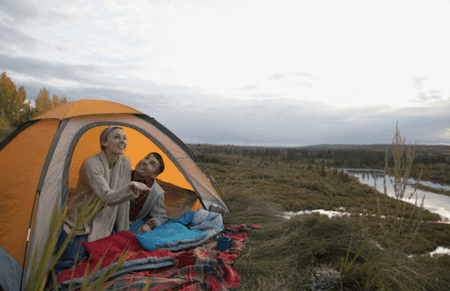To make your camping experience worth remembering, it’s an enthralling idea to waterproof the tent floor.
Definitely, a dry tent floor ensures that you don’t get stuck in the water. However, many people face a conundrum on how to waterproof a tent floor.
This piece of writing is an easy guide for both starters and mid-level camping enthusiasts to learn the methods of waterproofing a tent floor.
The writing is divided into a few sections that include the importance of waterproofing a tent, methods of waterproofing, a few special tips, and key important questions that may arise in your mind.
Is It Worth Waterproofing A Tent?
Most people tend to rely on the tent itself to protect them from bad weather. That is not the case each and every time.
There are many tents available that are not waterproof, even those that pretend to be waterproof sometimes cannot protect the users from rainwater due to leakages.
That’s why it’s an excellent idea to opt for waterproofing the tent floor for a better camping experience.
Suppose you are enjoying a breathtaking camping experience with your friends in the wilderness of the Grand Canyon in Arizona, suddenly a flash of intense rain washes your tent and keeps you tainted and all washed away!
Just imagine what your mind would be thinking!
Not only will your clothes be wet but you can be caught with an intense cold if not pneumonia.
Camping preparation is a hectic process and after spending huge energy on collecting different camping essentials, if the dampened tent floor turns out to be the reason for your bad experience, that is really sad and unwanted.
So, that’s the point that describes the importance of waterproofing the floor of your tent.
5 Steps To Waterproof A Tent Floor
Now that you know it’s more than necessary to waterproof a tent floor, let’s discuss the methods of waterproofing a tent floor.
Step 1: Check The tent
A thorough check of the tent is required to find out the exact leakage areas. Generally, the leakage to a tent can occur in either seam, fabric, or the rain fly.
These three areas require different sealants for waterproofing. So, if you don’t know the leakage area you will not be able to purchase the right waterproofing.
Step 2: Buy A Tent Sealer
Sealer blockages the leakages of your tent and acts as a great resistor to water. It also makes the tent durable enough.
To seal your tent you need to buy an excellent waterproof sealant that is specially designed for tents. Before you buy, don’t forget to check out the sealer you are buying.
Step 3: Wash The Tent
If your tent is a brand new one, the fabric commonly keeps shining, but if the tent is a relatively older one, then the fabric may look clumsy with dirt on it.
So, it’s good to give your tent a thorough wash to find out the leakages more efficiently. After a good wash, dry the tent adequately and it will be ready for coating.
Step 4: Coating The Tent
Now that you know the problems of your tent, checked it properly, and have given it a damn good wash, your tent is ready for coating.
If your tent is a smaller one you can finish it coating entirely with a single coat, however, if the tent is a larger one you need to coat it section-wise (seam, fabric, rain fly).
As this is the most important phase, pay all your attention and read the following steps. These steps are key to an excellent tent coating.
Find A Suitable Place
It’s better to place your tent on a dry, clean place so that you can coat it without the tent getting wet somehow and you don’t get disturbed.
Take a Brush
Buy a brush you find suitable for yourself. It can be a small, medium, or large-sized paintbrush according to your choice.
Quality Sealant
We have discussed quality sealants and their importance in the second step.
Wear A Glove
It’s better if you coat your tent with hand gloves, so I would suggest you buy a pair of hand gloves.
Coating
Apply the sealant with the paintbrush along the seams, fabric, and the rain fly. Keep applying for at least 20 minutes.
Drying The Coat
After applying the sealant you need to dry the tent properly including the inside. An average of 8-12 hours are enough to completely dry the tent.
Step 5: Additional Coating
It’s a good idea to add an extra layer of coating to your tent. No need to wait for 10-12 hours after you have applied the first coating so that your tent gets dry. You can apply the second coating while your tent is still drying.
This additional coating is for your utmost satisfaction and also this additional layer will make the waterproofing sound and most effective.
Special Tips On Waterproofing A Tent Floor
#1. Be Doubtful Of The Weather
As camping places most often tend to be near mountains, wild forests, or the sea-sides, it is wise not to rely on the weather forecast.
Weather is like a box of chocolate, you never know what you’re going to get while out camping. So, it’s always a better idea to waterproof your tent floor.
#2. Groundsheet Checking
Sometimes the groundsheet occurs to be the reason for your tent floor getting wet.
To get rid of this problem it’s better to look for groundsheets or tarp that come as a part of the tent and help the tent to get out of reach of the water.
#3. Waterproof Rating Checking
HH is the acronym for hydrostatic head otherwise known as waterproof rating. It measures how waterproof your tent is.
The HH indicates the depth of a column of water the tent can endure before the leakage starts inviting water.
For instance, a tent having a 4,000mm HH means that the tent will be able to keep a column of water 4,000mm deep.
Now, when you purchase the tent, try buying the tents that have a higher HH rate.
Tent Floor Waterproofing FAQs
What Is The Best Tent Seam-Sealer?
It’s always preferable to buy tent seam sealers that come with quality. Be advised that not all your tent sealer available on the market comes with quality.
If you ask for recommendations here are my 5 best picks:
- Gear Aid Seam Grip SIL
- Coleman Seam Sealer
- Texsport Waterproof Polyurethane Seam Sealer
- Kenyon Seam Sealer
- Iosso Seam Sealer
What Are The Qualities To Look Into While Purchasing A Seam Sealer?
First comes the fabric of your tent. You need to buy a seam sealer that is effective on the fabrics that your seam sealer possesses. Nylon, canvas, polyester are the most common tent fabrics.
So, before you purchase a seam sealer check the fabrics of your tent. Secondly, the thickness of the sealer.
Both thick and thin sealers are okay for your tents.
How Many Sealers To Buy To Waterproof A Tent Floor?
It actually depends on the size of your tent. If your tent is smaller you need less amount of sealer but in the case of larger sized tents, you need to make sure that you buy a sufficient amount of sealer so that you don’t run out of sealer while waterproofing your tent.
Generally, for larger tents 4 ounces of seam sealer is okay.
Conclusion
The above discussion will make you efficient in waterproofing your tent if you go through the easily discussed methods.
Hopefully, searching for how to make a tent waterproof, the discussion and tips above are enough to make you prepared for the next camping journey.
Be advised that the manual that you will receive while buying your tent is very important and if you go through the instructions things will be easier for you.
Start preparing for your next trip without any concern and make the best out of it. Enjoy.


